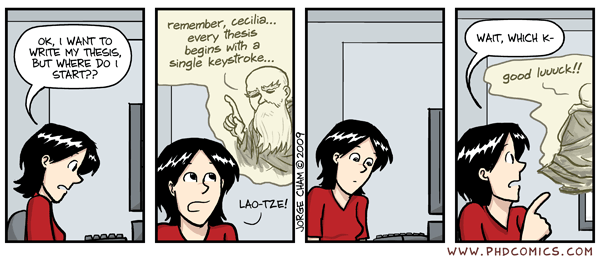Everything is procrastination…
Procrastination will probably never become a popular competitive sport, but if it ever did I would put most of my money on the PhD students of the world. While it is really difficult to measure procrastination the joy of working on a long-term, individually driven project creates both an extreme familiarity with the concept and the personal hell it entails.
Most people have a vague understanding of their, and others, procrastination abilities. But in a recent conversation in the coffee room I discovered a shocking lack of deeper understanding of the term. Further study is definitely required.
From my own sporadic research I have come to recognize four forms of procrastination: passive, active, positive and entropic. But first lets get some of the theory and definition straight. This is of course easily done by ripping it off Wikipedia:
…procrastination refers to the act of replacing high-priority actions with tasks of lower priority, or doing something from which one derives enjoyment, and thus putting off important tasks to a later time. In accordance with Freud, the Pleasure principle (psychology) may be responsible for procrastination; humans do not prefer negative emotions and handing off a stressful task until a further date is enjoyable. The concept that humans work best under pressure provides additional enjoyment and motivation to postponing a task.
As any good procrastinator will know there is nothing more useful than a minor diagram, preferably using a simple grid which has limited explanatory value but is a major procrastinatory tool in of itself.
 Figure 1. Forms of procrastination organized by benefit and control
Figure 1. Forms of procrastination organized by benefit and control
Figure 1 attempts to map out the four major forms of procrastination according to the benefits they bring and the amount of control the individual has over the need to conduct the activity.
Positive procrastination is doing tasks which will actually be beneficial to the main project but doing them in the wrong order. Emptying a mailbox in order to gain time and peace of mind is an excellent example. The individual has a great deal of autonomy in deciding this task and it will, in the long run, be beneficial. However, this benefit will not appear unless the actual task is completed. Therefore the actual benefit of the task is only a potential benefit and conditional to actually not procrastinating.
Active procrastination entails finding something else to do instead of doing the task in hand. This can be everything from laundry, exercising, to re-arranging books. The individual has a great deal of choice in carrying out the task – even if it is commonly defined as necessary in order to do prior to carry out real work. This has actually no benefit at all to the task at hand.
Passive procrastination is doing stuff that the individual has previously agreed to. This is when you look at your calender and realize that the day is full. Therefore the individual maintains the illusion that actual work could be done were it not for the necessity of the meetings previously booked in the calender. Examples of passive procrastination are teaching, administrative meetings or conferences. In passive procrastination the illusion of real progress is masked and, in many cases, the procrastinator is given the opportunity of not defining the tasks as procrastination. These tasks are usually important and beneficial but the level of control is low as we are forced to participate in teaching and administration with a low connection to the job we are procrastinating from.
Entropic procrastination is probably the most harmful form. The body experiences a physical barrier to commencing work and becomes an inert mass. Examples of this? Surfing pointless websites & watching most forms of daytime television.
The problem with the study of procrastination is that the different forms are very difficult to identify objectively and are defined by the lies we tell ourselves.




